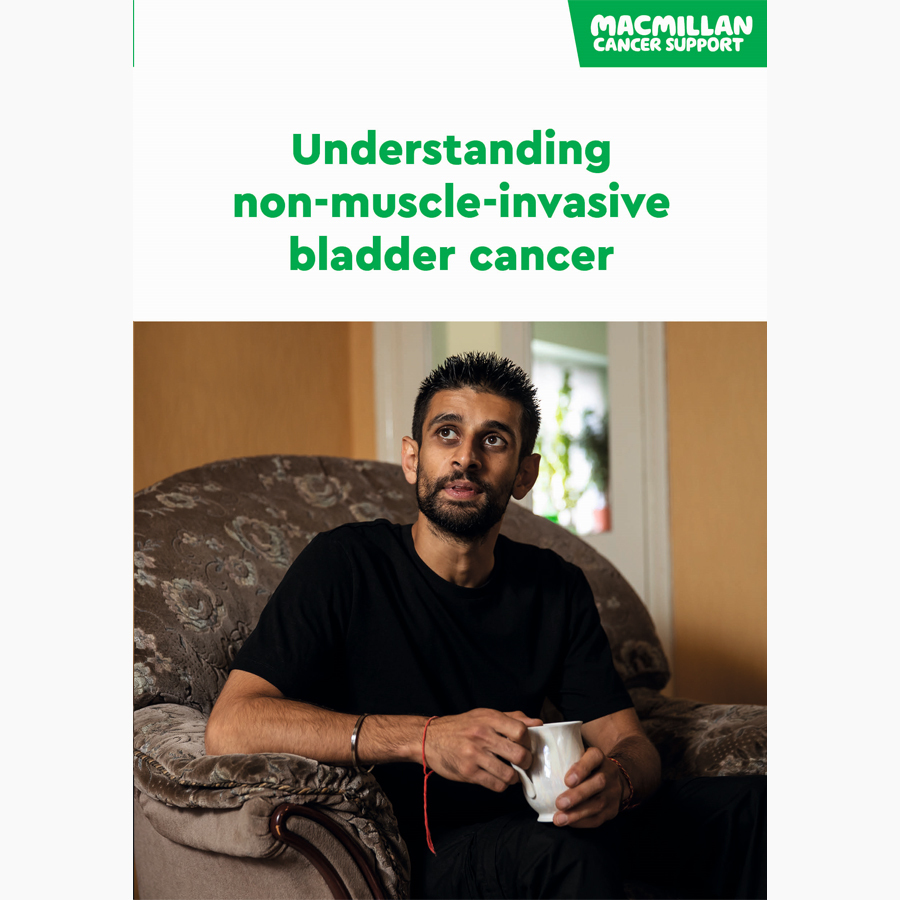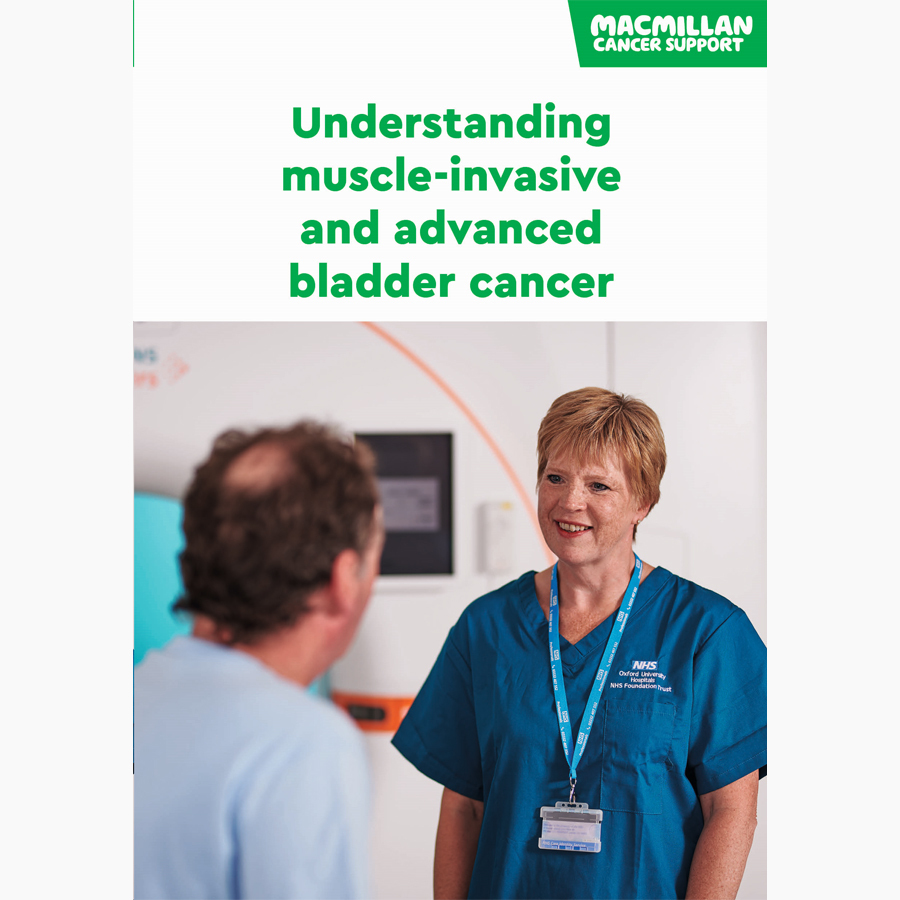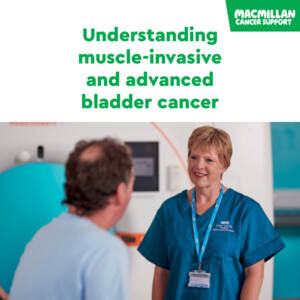What is bladder cancer?
The bladder is a hollow and muscular organ that collects and stores pee (urine). In the UK, over 10,000 people are diagnosed with bladder cancer each year. The actual number is likely to be higher than this because of the way this information is collected.
Bladder cancer is often described using the following terms. These explain whether the cancer is only in the bladder lining or has spread through the wall of the bladder.
-
Non-muscle-invasive bladder cancer (NMIBC)
The cancer cells are in the inner lining or the connective tissue that surrounds the inner lining of the bladder. They have not spread into the muscle layer.
Non-muscle-invasive bladder cancer can be mushroom shaped, which is called a papillary tumour or Ta. It can also be flat and red, which is called carcinoma in situ (CIS). Some people may have both a papillary tumour and CIS. If cancer cells are in the connective tissue this is called T1. -
Muscle-invasive bladder cancer (MIBC)
The cancer is in the muscle layer of the bladder or has spread through the muscle into the fat layer. It has not spread outside the bladder.
-
Locally advanced bladder cancer
The cancer has spread outside the bladder into nearby tissues, the prostate, vagina, ovaries, womb or back passage (rectum). It may also be in lymph nodes in the pelvis, near the bladder.
-
Advanced bladder cancer
The cancer has spread to other parts of the body.
Booklets and resources
Types of bladder cancer
There are different types of bladder cancer. These are named after the cell they started in.
The most common type is called urothelial cancer. It is also called urothelial carcinoma or transitional cell carcinoma (TCC). It starts in cells called urothelial or transitional cells in the bladder lining.
Less common types of bladder cancer include:
- squamous cell carcinoma
- adenocarcinoma
- small cell bladder cancer.
These start from different types of cells in the bladder lining. They are usually muscle-invasive bladder cancers.
Related pages
Symptoms of bladder cancer
The most common bladder cancer symptom is blood in the pee (urine). Blood in pee is also called haematuria. This can be blood that you can see, which may be called visible blood. Or it can be blood that is seen when a doctor or nurse does a urine dipstick. This may be called non-visible blood.
Many people with blood in their pee will not have bladder cancer. But if you have any symptoms, it is important to get them checked by your GP. The earlier bladder cancer is diagnosed the more likely it is to be cured.
We have more information about signs and symptoms of bladder cancer.
Related pages
Causes of bladder cancer
There are certain things that can affect the chances of developing bladder cancer. These are called risk factors.
The risk of bladder cancer is higher in people over the age of 60. It is less common in people under the age of 40. Another risk factor is smoking. Smoking may cause about 5 in 10 (50%) bladder cancers.
We have more information about these and other causes and risk factors of bladder cancer.
Diagnosis of bladder cancer
If you have any symptoms you should see your GP. They can test your pee (urine) for blood and send it to a lab to check for a urine infection (UTI). They may also send the pee away to be tested for cancer cells.
They may examine you internally. This is because the bladder is close to the bowel, and the prostate or womb. The doctor inserts a gloved finger into the back passage (rectum) or vagina. This is called an internal examination. They will feel to see if there are any obvious changes.
If your GP thinks you may have cancer or is not sure what is causing your symptoms, they will refer you to a urologist. This is a doctor who treats bladder and kidney problems. Or you may see a nurse called a urology nurse specialist. If tests or symptoms suggest you could have bladder cancer, your GP will refer you urgently. This means you should get a specialist appointment as soon as possible.
Most people see the nurse or doctor at a haematuria clinic or at a hospital’s urology department. The doctor or nurse may test your pee and give you an internal examination again. They will arrange for you to have further tests if they think you need them. You usually have most of the tests on the same day.
Tests
You may have some of the following tests:
-
Cystoscopy
A cystoscopy is the main test to check for signs of cancer inside the bladder. A cystoscope is a thin tube with a camera and light on the end. A doctor or specialist nurse uses it to look at the inside of the bladder. There are different types of cystoscopy. Your doctor or nurse will explain what type you need.
-
Blood tests
You may have blood tests to check how well your kidneys and liver are working and to show the number of blood cells in the blood.
-
Urine tests
A sample of your pee (urine) may be tested for cancer cells. It may also be tested for substances that are found in bladder cancer. This is called molecular testing.
-
Ultrasound scan
An ultrasound scan uses sound waves to build up a picture of the inside of the body. It can show anything unusual in the urinary system. You will be asked to drink plenty of fluids so that the bladder can be seen easier. This may be uncomfortable, but you will be able to pee (pass urine) as soon as the scan is over. If you have any concerns about this, talk to the person doing the scan.
For the scan you will lie on your back and the person doing the scan will try to make you comfortable. They spread a cold gel over your tummy (abdomen) and pass a small device that makes sound waves over the area. The sound waves are then turned into a picture by a computer. The scan is painless and takes about 15 to 20 minutes. -
CT urogram
A CT urogram uses a series of x-rays to build up a 3D picture of the bladder, ureters and kidneys.
You may also have tests to check areas near the bladder or to look for signs of cancer in other areas of the body. These may include:
-
CT scanA CT scan takes a series of x-rays, which build up a 3D picture of the inside of the body.
-
MRI scan
An MRI scan uses magnetism to build up a detailed picture of areas of the body.
-
PET-CT scan
You may have a PET scan and a CT scan together. This is called a PET-CT scan. A PET scan uses a low dose of radiation to check the activity of cells in different parts of the body. It can give more detailed information about cancer or abnormal areas seen on x-rays, CT scans or MRI scans.
Waiting for test results can be a difficult time. We have more information that may help.
Staging and grading of bladder cancer
The stage of a cancer describes where the cancer has been found and other places it has spread to.
Grading describes how the cancer cells look under the microscope compared with normal cells.
Knowing the stage and grade helps your doctors plan the best treatment for you.
We have more information about staging and grading of bladder cancer.
Treatment for bladder cancer
A team of specialists will meet to discuss the best possible treatment for you. This is called a multidisciplinary team (MDT).
Your treatment may depend on:
- the type of cancer
- the stage and grade of the cancer
- how many tumours there are
- your general health.
You can read about treatments for different stages of bladder cancer below. We also have more information about treating bladder cancer and making treatment decisions.
Your cancer doctor, radiotherapy specialist or nurse will explain the different treatments and their side effects before you agree (consent) to have treatment. They will also talk to you about the things you should consider when making treatment decisions.
You may have some treatments as part of a clinical trial.
Treating non-muscle-invasive bladder cancer
Non-muscle-invasive means the cancer cells are in the inner lining or the connective tissue that surrounds the inner lining of the bladder. They have not spread into the muscle layer below this.
Treatments may include the following:
-
Transurethral resection of the bladder (TURBT)
A TURBT is an operation to remove bladder cancer from the inside of the bladder. It is the main treatment for non-muscle invasive bladder cancer.
-
Intravesical chemotherapy
Chemotherapy uses anti-cancer (cytotoxic) drugs to destroy cancer cells. Intravesical chemotherapy is when the chemotherapy is given directly into the bladder through a tube called a catheter.
-
BCG
BCG is short for Bacillus Calmette-Guérin. It is a type of immunotherapy drug. Immunotherapy drugs use the body’s immune system to find and attack cancer cells. For bladder cancer, BCG is given directly into the bladder through a tube called a catheter (intravesical).
Cystectomy
Some people may have a cystectomy. This is surgery to remove the bladder. You may be asked to think about this if you have:
- a high-risk cancer
- a cancer that keeps coming back and treatments are not working.
Other treatments
Sometimes other treatments may be used to treat non muscle-invasive bladder cancer. The following treatments may only be available at some hospitals:
-
Heated intravesical chemotherapy
This is when chemotherapy into bladder is heated. This may make it work better.
-
Electromotive intravesical chemotherapy
This is when a small electrical current is given into the bladder at the same time as the chemotherapy. This may make it work better.
-
Tumour ablation
This treatment uses a laser called an infra-red light during a cystoscopy to burn any areas of cancer away.
New treatments are being developed for non-muscle-invasive bladder cancer. Some treatments may be offered as part of a clinical trial. This includes immunotherapy.
Treating muscle-invasive bladder cancer
Muscle-invasive means the cancer has spread into or through the muscle layer of the bladder wall. Treatment usually aims to cure the cancer with one of the following:
-
Cystectomy
Cystectomy is surgery to remove the bladder, and make a new way for you to pass urine (pee), called a urinary diversion. You may also have chemotherapy into a vein before or after the operation. These anti-cancer drugs help reduce the risk of cancer coming back.
-
Radical radiotherapy
Radiotherapy uses high-energy rays to destroy cancer cells. Radical radiotherapy is radiotherapy with other treatments such as surgery or chemotherapy.
Treating locally advanced bladder cancer
Locally advanced means the cancer has spread outside the bladder into nearby areas of the body.
The best treatment depends on what areas of the body are affected.
Some people will have treatment that aims to cure the cancer. There is more information about this under the ‘Treating muscle-invasive bladder cancer’ heading above.
Others will have treatment that aims to control the cancer and any symptoms it is causing. There is more information about this under the ‘Treating advanced bladder cancer and symptoms’ heading below.
Treating advanced bladder cancer and symptoms
Advanced bladder cancer is cancer that has spread from the bladder to other parts of the body. Sometimes this is called metastatic bladder cancer.
People with advanced and some people with locally advanced bladder cancer have treatments that aims to:
- shrink or control the cancer and help you live longer
- reduce your symptoms and improve quality of life.
This is called supportive treatment or palliative treatment. It may include the following:
-
Chemotherapy
Chemotherapy uses anti-cancer (cytotoxic) drugs to destroy cancer cells.
-
Immunotherapies
Immunotherapy drugs use the immune system to find and attack cancer cells.
-
Radiotherapy
Radiotherapy uses high-energy rays to destroy cancer cells. You may have radiotherapy to treat bladder symptoms, such as bleeding. It may also be given if bladder cancer has spread to the bones.
-
Bone strengthening drugs
Drugs called bisphosphonates or a drug called denosumab help strengthen the bones and may reduce bone pain.
-
Ureteric stent
If cancer has blocked the tube called the ureter between the kidney and the bladder, your doctor may suggest an operation to put a tube (stent) in to open the ureter. This is called a ureteric stent.
-
Nephrostomy
A nephrostomy is a tube that lets urine drain from the kidney through an opening in the skin on the back. You may need this if cancer has blocked the tube called the ureter between the kidney and the bladder. The nephrostomy tube is attached to a drainage bag outside the body.
You may have some treatments as part of a clinical trial. Your doctor will explain if this is available.
After bladder cancer treatment
Follow-up after treatment
After treatment for bladder cancer, you will have regular follow-up appointments with your cancer doctor or nurse. These are usually every few months to start with. If you have any problems or notice new symptoms between appointments, let your doctor or nurse know as soon as possible.
-
Non-muscle-invasive bladder cancer follow-up
The most important test for follow-up is a cystoscopy. How often you have a cystoscopy depends on the risk of the cancer coming back. High-risk and intermediate-risk tumours need to be monitored more often than low-risk tumours.
You may also have your pee (urine) checked for cancer cells. At first, follow-up appointments will usually be every 3 to 6 months. -
Muscle-invasive bladder cancer follow-up
You may have scans to check for any sign of the cancer coming back. Your doctor or nurse will explain what type of scans and how often you need these.
You will have regular scans and blood tests to check your kidneys are working well, if you have a:If you had a cystectomy but your urethra was not removed during surgery, there is a small risk that the cancer could come back there. You will have tests every year to check the urethra. These are called urethroscopies. This usually continues for 5 years.
If you had radiotherapy, you will have regular cystoscopies. These are important because if cancer comes back, you may be able to have surgery to treat it again. The cystoscopies will be every 3 months at first, but less often over time. You will have them for at least 5 years after treatment finishes. -
Advanced bladder cancer follow-up
You will have regular appointments with your doctor or nurse to check how you are. They will also help manage any symptoms caused by the cancer. You may have tests and scans to monitor the cancer.
You may also have appointments with a palliative care team. This is an expert team that helps manage symptoms, such as pain or nausea. There are palliative care teams based in hospitals, hospices or in the community. Your cancer doctor or nurse can give you more information.
You may get anxious between appointments. This is natural. It may help to get support from family, friends or a support organisation.
Macmillan is also here to support you. If you would like to talk, you can:
- Call the Macmillan Support Line on 0808 808 00 00.
- Chat to our specialists online.
- Visit our bladder cancer forum to talk with people who have been affected by bladder cancer, share your experience, and ask questions.
Well-being and recovery
Making small changes such as eating well and keeping active can improve your health and well-being and help your body recover.
Even if you already have a healthy lifestyle, you may choose to make some positive lifestyle changes after treatment.
Some treatments for bladder cancer can cause ongoing side effects. This may include bladder or bowel changes, or problems with sexual well-being. Sometimes side effects are long term. You can find out more in our information about each type of bladder cancer treatment.
Help and support is available, and there are usually things that can help you cope. Talk to your cancer doctor, nurse or GP if you have side effects or changes and need advice.
Related pages
About our information
-
References
Below is a sample of the sources used in our bladder cancer information. If you would like more information about the sources we use, please contact us at cancerinformationteam@macmillan.org.uk
Mottet N, Bellmunt J, Briers E, et al. Non-muscle-invasive bladder cancer (TaT1 and CIS). European Association of Urology (Internet), 2021. Available from uroweb.org/guideline/non-muscle-invasive-bladder-cancer (accessed September 2021).
Witjes JA, Bruins HM, Cathomas R, et al. Muscle-invasive and metastatic bladder cancer. European Association of Urology (Internet), 2021, Available from uroweb.org/guideline/bladder-cancer-muscle-invasive-and-metastatic (accessed September 2021).
-
Reviewers
This information has been written, revised and edited by Macmillan Cancer Support’s Cancer Information Development team. It has been reviewed by expert medical and health professionals and people living with cancer. It has been approved by Senior Medical Editor, Dr Ursula McGovern, Consultant Medical Oncologist.
Our cancer information has been awarded the PIF TICK. Created by the Patient Information Forum, this quality mark shows we meet PIF’s 10 criteria for trustworthy health information.
Date reviewed
This content is currently being reviewed. New information will be coming soon.

Our cancer information meets the PIF TICK quality mark.
This means it is easy to use, up-to-date and based on the latest evidence. Learn more about how we produce our information.






